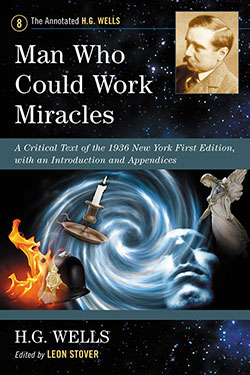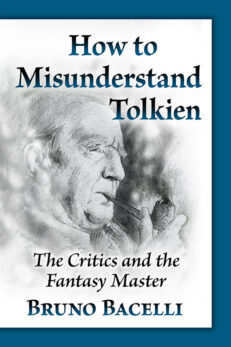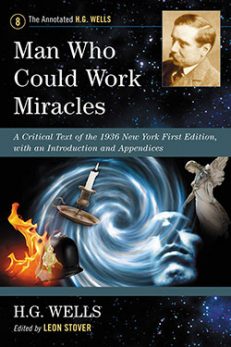Man Who Could Work Miracles
A Critical Text of the 1936 New York First Edition, with an Introduction and Appendices
$29.95
In stock
About the Book
Man Who Could Work Miracles (without a The) is a 1937 film, ostensibly a comedy, that H.G. Wells scripted late in life for London Film Productions. This work is a literary text of the scenario and dialogue published in advance of the movie’s release. Wells himself says it is “a companion piece” to Things to Come, his deadly serious film done a year before, also produced by Alexander Korda.
The editor’s introduction explains how two such radically different films are related and discusses the artistic quality of the text, Wells’ overriding sense of cosmic vision, his views on sex and politics, and his uncommon estimate of the common man’s incapacity for public affairs. The world’s foremost Wellsian scholar here brings his unique analytical powers to bear on, in the opinion of many, the strangest work Wells ever wrote. The appendices include the 1898 short story version, “The Man Who Could Work Miracles,” three related cosmic-vision short stories by Wells, and an excerpt from a 1931 radio address by Wells not inaccurately retitled “If I Were Dictator of the World.”
About the Author(s)
Bibliographic Details
H.G. Wells
Format: softcover (6 x 9)
Pages: 152
Bibliographic Info: 3 photos, annotations, appendices, bibliography, index
Copyright Date: 2012 [2003]
pISBN: 978-0-7864-6876-8
Imprint: McFarland
Series: The Annotated H.G. Wells
Table of Contents
Preface viii
Introduction 1
1 The Text 1
2 Cosmic Vision 2
3 Sex and Politics 3
4 The Common Man 4
Man Who Could Work Miracles (1936) 7
(Annotated text of the first New York edition) 8
Appendices
I: “The Man Who Could Work Miracles” (1898) 95
II: “A Vision of Judgment” (1899) 111
III: “Under the Knife” (1896) 117
IV: “If I Were Dictator of the World” (1931) 130
Bibliography 139
Index 141
Book Reviews & Awards
“Wells’s masterpieces get the red-carpet treatment here in these luxurious editions…academic collections supporting English departments should definitely invest in this volume”—Library Journal; “Stover is to be thanked for his years of Wellsian scholarship”—Public Library Quarterly; “Stover, by presenting the intellectual underpinnings of Wells’ work, has provided a powerful tool for understanding his writings, one sees them more deeply, without losing that earlier sense-of-wonder that originally opened the vistas of the young reader’s mind…a crucial guide to these classics of science fiction”—Fosfax; “two cheers for Stoverism…formidable scholarship…serious students of Wells would be foolish to ignore ‘Stoverism’”—The Wellsian; “quite interesting. This is a part of series of high quality volumes of annotated work by Wells which McFarland has been publishing under the editorship of Stover, and it is by far the rarest item yet”—Critical Mass; “Stover should be commended for a painstaking and meticulous editorial commentary”—Utopian Studies; “extensively annotated and analyzed by Stover…annotations are filled with insights into Wells’ writings and philosophy”—C&RL News.





